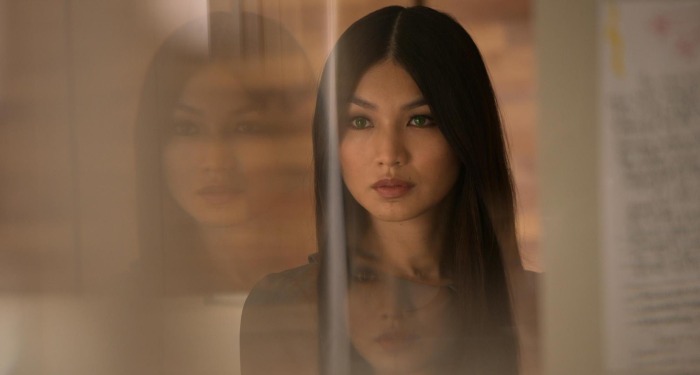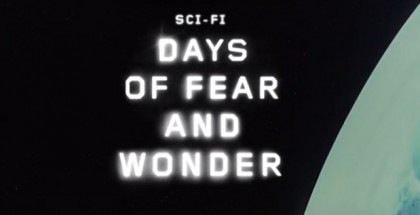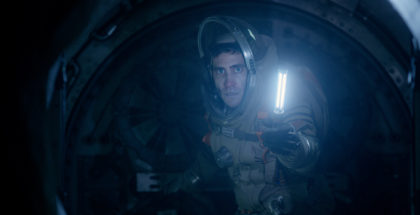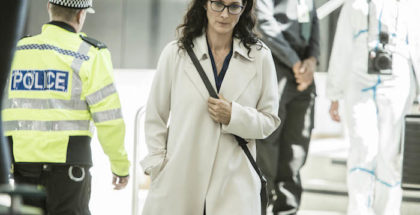Channel 4 TV review: Humans Episode 1
Review Overview
Unspoken mystery
8Unsubtle voice-over
5Cast
8David Farnor | On 14, Jun 2015
This contains mild spoilers.
“What if she isn’t pretty? Can we change her for another one?”
That’s the daughter of Laura (Katherine Parkinson), whose husband, Joe (Tom Goodman Hill), buys a new Synth to help around the house. They’re the latest must-have gadget in Channel 4’s sci-fi series, a robotic servant almost indistinguishable from humans.
Humans and machines. Machines and humans. Science fiction has wrestled with the boundary between them for years. Isaac Asimov’s laws of robotics loom over the whole set-up, reminding us that these avenues have already been explored. In an age of omnipresent technology, though, Humans has an alarming, topical tone: with computers are getting more advanced every day and people already living through their mobile phones, who wouldn’t choose to have an android companion?
It’s fitting that such a cutting edge subject was set to mark the entry of Microsoft into the online video world, an Xbox original programme that would rival Sony’s own series, Powers. Since then, though, Xbox Entertainment Studios has closed its doors, leaving Humans to premiere on regular US TV (and on Channel 4, as always planned, in the UK) – a fact that echoes the overriding sentiment that this isn’t quite as innovative as one might suspect.
Created by Spooks writers Jonathan Brackley and Sam Vincent (and based on the Swedish series, Real Humans), the show’s opening hour is a quick jog around its various subplots, as we meet a variety of Synth owners.
There’s Laura and Joe, whose new purchase, Anita, proves to be a jarring family addition: while Joe is all for the gadget, she is far from happy, feeling usurped as Anita tries to read bedtime stories to their youngest or check in on the kids while they’re sleeping. There’s Leo (Colin Morgan), a guy on the run with his own Synth, Max (Ivanno Jeremiah), although we’re not quite sure why. And there’s George (William Hurt), a widower with an out-of-date Synth, Odi, to whom he’s too attached to upgrade.
It’s a well-conceived bunch and the writers juggle the often-awkward business of introducing each story line with an agile sense of pace. The world-building, meanwhile, is equally rapid, given a helping hand by just how plausible the premise is. Passing shots of Synths in the background, handing out newspapers at train stations with their uncanny-valley faces, seamlessly establish them as part of our daily routines. (A smart cameo from Krishnan Guru-Murthy is also effective.)
But the show is at its best when standing still to subtly observe the diverse nature of each character’s relationship with their Synth: a tactic so well deployed in Channel 4’s other dystopian sci-fi series, Black Mirror, to which this automatically draws comparisons.
Morgan – who looks worlds away from Merlin as the rugged outlaw, with pro-Synth sensibilities – addresses the issue of android-human relations head-on, as it becomes apparent that some work as dancers for human voyeurs. Parkinson, meanwhile, continues to impress in every role she takes as the stressed-out mother, who can’t relax when the unnatural object is in the same room as her.
Hurt, though, is given the most powerful material, as his forgetful loner increasingly relies upon his android not for company but as a walking hard drive full of memories of loved ones. From Odi’s jumper to George’s old-fashioned furniture, he carries with him a melancholy that anchors the futuristic concept. One stand-out scene in a supermarket sees him having to choose between helping his Synth and another human – a dilemma that would seem simple, until you’ve spent time hearing him reminisce by proxy, through the memory banks of his trusty servant. Another sees Anita laugh at a joke at the breakfast table, only to continue to giggling long after everyone else has finished. “You can stop now,” says Laura. Anita immediately returns to her default blank expression.
These small moments, so well performed by the cast, give the show its mundane believability, as well as its otherworldly mystery – the latter much more so than the broadly familiar genre narratives (a sentient droid here, a man hunting them down there). Right from that early question, it’s clear that concepts of ownership and superficial appearance have seeped through this ultra-connected society all the way down to its children, who see the Synths as half-plaything, half-parent. The suggestion of forced upgrades to better models, meanwhile, lends a dark, corporate undertone to the glossy civilisation.
Amid it all, Gemma Chan is exceptional as Anita, bringing a sense of unease to her eerily lifelike computer; a shot of her sitting on the sofa, her blue-green contact lenses glinting, is unnerving in its simplicity. She says nothing, but the camera stays near, daring us to imagine what’s going on behind those eyes. Do androids dream? Are they capable of switching off pain? Can you teach a machine to forget? Would they dodge a bullet, if it meant the projectile ricocheting off a wall and hitting a person?
Quick visual cutaways and one final, provocative close-up leave these things hanging in the air, along with a lingering question: are these robots creepy because they occasionally seem human, or because they don’t seem human enough? It’s a shame, then, that the episode has to follow it with a heavy-handed voice-over that outlines all of those riddles and more – a barrage of exposition over a cheesy montage that undoes a lot of the unspoken intrigue that went before. What begins as an interesting, subtle piece of fiction concludes with the unsubtle suggestion that, while its subject matter is advanced, Humans doesn’t necessarily trust its audience to be able to process things quickly enough.
Humans is on Sundays at 9pm on Channel 4, with each episode available to watch live online and catch up with after broadcast on All 4.




















